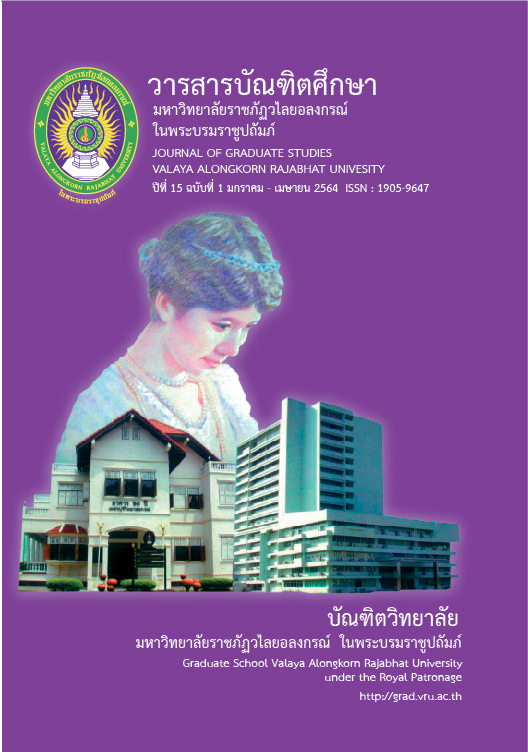A STUDY OF FACTORS AFFECTING KNOWLEDGE SHARING BEHAVIORS OF ELECTRONICS SECTOR IN ELECTRICAL AND ELECTRONICS INDUSTRY
Main Article Content
Abstract
This research aimed to 1) study problems and obstacles of knowledge sharing in electronics industry, and 2) Study factors affecting knowledge sharing in electronics industry. Mixed method research approach was employed as follows 1) qualitative research Data were gathered through in-depth interviews. Selected as informants by lottery method of sampling and 2) quantitative research data were collected via questionnaire. For statistical analysis, it included percentage and multiple regression analysis to test the hypothesis.
The research results found that: 1) overall, the problems and obstacles of knowledge sharing were Employees lack good attitude towards knowledge sharing. There were still few listeners and motivation, and the organization lacks systematic management of knowledge sharing. And 2) the results of the study affecting knowledge sharing in Thailand electronics industry found that organizational culture factor, information technology factor, leadership factor and motivational factor had positive relationship towards knowledge sharing in electronics industry. Qualitative and quantitative research were consistent.
Article Details

This work is licensed under a Creative Commons Attribution-NonCommercial-NoDerivatives 4.0 International License.
บทความทุกเรื่องได้รับการตรวจความถูกต้องทางวิชาการโดยผู้ทรงคุณวุฒิ ทรรศนะและข้อคิดเห็นในบทความ Journal of Global of Perspectives in Humanities and Social Sciences (J-GPHSS) มิใช่เป็นทรรศนะและความคิดของผู้จัดทำจึงมิใช่ความรับผิดชอบของบัณฑิตวิทยาลัย มหาวิทยาลัยราชภัฏวไลยอลงกรณ์ ในพระบรมราชูปถัมภ์ กองบรรณาธิการไม่สงวนสิทธิ์การคัดลอก แต่ให้อ้างอิงแหล่งที่มา
References
Adamovic, D., Potgieter, A. & Mearns, M. (2012). Knowledge sharing through social media: Investigating trends and technologies in a global marketing and advertising research company. South African Journal of Information Management. 14(1), 1-7.
Akhavan, P., Rahimi, A. & Mehralian, G. (2013). Developing a model for knowledge sharing in research centers. Journal of information and knowledge management systems. 43(3), 357-393.
Anonymous. (2018, July 7). Interview by Kleebprathum P. [Tape recording]. Electronics Industry public company, Ayutthaya.
Alawi, A., Ismail, A., Marzooqi, N. Y. A., & Mohammed, Y. F. (2007). Organization culture and knowledge sharing : critical success factors. Joural of Knowledge Management. 11(2), 22-42.
Blau, P. M. (1964). Justice in social exchange. Sociological Inquiry. 34(2), 193-206.
Charband, Y. & Navimipour, N. J. (2016). Knowledge sharing mechanisms and techniques in project teams: Literature review, classification, and current trends. Computers in Human Behavior. 62, 730-742.
Department Of Industrial Promotion. (2017). nǣonōm ʻutsāhakam faifā læ ʻilekthrō̜nik [Electrical and Electronic industry trends]. Retrieved from https://bsc.dip.go.th/th/category/sale-marketing/sm-powerelectronic2560.
Davenport, T. O. (1999). Human capital. Management Review. 88(11), 37-43.
Electrical and Electronics Institute. (2016). rāingān sathānakān sētthakit ʻutsāhakam faifā læ ʻilekthrō̜nik [Economic and Electronics Industry Situation Report]. Retrieved from http://eiu.thaieei.com/box/Outlook/47/%E0%B9%84%E0%B8%95%E0%B8%A3%E0%B8%A1%E0%B8%B2%E0%B8%AA%204%20%202559.pdf.
Electrical and Electronics Institute. (2017). čhamnūan phūprakō̜pkān læ rǣngngān [Number of entrepreneurs and labour] Retrieved from http://eiu.thaieei.com/Labour.aspx.
Granovetter, M. (1983). The strength of weak ties: A network theory revisited. Sociological theory. (1), 201-233.
Government Savings Bank Research Center. (2019). khō̜mūn ʻutsāhakam ʻilekthrō̜nik [Electronics industry information]. Retrieved from https://www.gsb.or.th/getattachment/677a0ce8-f770-4d2a-9218-d0d16b72b0a1/IN_electronic_Q3_59_detail.aspx.
Government Savings Bank Research Center. (2020). khō̜mūn ʻutsāhakam ʻilekthrō̜nik [Electronics industry information]. Retrieved from https://www.gsb.or.th/getattachment/b75c710f-d14a-456b-8556- 186c2a06507/7_electro_5_62_detail.aspx.
Hansen, M. T, Nohria, N. & Tierney, T. J. (1999). What is your strategy for managing knowledge? Harvard Business Review. 106-116.
Kim, S., & Lee, H. (2006). The impact of organizational context and information technology on employee knowledge sharing capabilities. Public administration review. 66(3), 370-385.
Kromranchai, C. (2011). Hon da khanāt khō̜ng klum tūayāng phư̄a kānwičhai [Specifying the sample size for the research]. Retrieved from http://www.jakkrit.lpru.ac.th/pdf/27_11_44/9.pdf.
Jarutirasarn, P. (2013). withīkān čhatkān khwāmrū nai phāk ʻutsāhakam kō̜ranī sưksā nikhom ʻutsāhakam thūa prathēt Thai [The Methods for Knowledge in Industrial Sector: Case Study of Industrial Estate all Thailanad]. Doctoral dissertation. Dhurakij Pundit University. RMUTT Global Business and Economics Review. 10(1), 61-72.
Lin, H. F. (2007). Knowledge sharing and firm innovation capability: an empirical study. International. Journal of manpower. 28(3/4), 315-332.
Ministry of Industrial. (2017) phǣn mǣbot kānphatthanā ʻutsāhakam Thai 2012-2031[National Industrial Development Master Plan]. Retrieved from http://www.oie.go.th/assets/portals/1/fileups/2/files/Industrial%20Master%20Plan/National_Industrial_Development_Master_Plan.pdf.
Ministry of Labour. (2020). sarup sathānakān læ nǣonōm dān rǣngngān [Summary of situations and trends in labour]. Retrieved from http://warning.mol.go.th/uploadFile/pdf/pdf-2019-01-04-1546575538.pdf.
Niyom, P. (2012). patčhai thī song phon tō̜ kān bǣngpan khwāmrū khō̜ng ʻongkān thurakit khanāt yai nai prathēt Thai [Factor Affecting Knowledge Sharing of Large Business Firms in Thailand]. Doctoral dissertation. Dhurakij Pundit University.
Nonaka, I., & Takeuchi, H. (1995). The knowledge-creating company: How Japanese companies create the dynamics of innovation. Oxford university press.
Park, J. G. & Lee, J. (2014). Knowledge sharing in information systems development Projects: explicating the role of dependence and trust. International Journal of Project Management. 32(1), 153-165.
Photisita, C. (2009). sāt læ sin hǣng kānwičhai chœ̄ng khunnaphāp [Science and art of quality research]. Bankok: Amarin Printing and Publisher.
Razak, N. A., Pangil, F., Zin, M. L. M., Yunus, N. A. M. & Asnawi, N. H. (2016). Theories of knowledge sharing behavior in business strategy. Procedia Economics and Finance Journal. 37(1), 545-553.
RitCharoon, P. (2001). rabīap withīkān wičhai thāng sangkhom [Social Science. Research]. Bangkok: Phranakhon Rajabhat University Book Centre.
Silpcharu, T. (2014). kānwičhai læ wikhro̜ khō̜mūn thāng sathiti dūai SPSS læ AMOS [Research and statistical analysis with SPSS and AMOS]. 15^th ed. Bangkok: SR Printing Mass Products.
Souri, A., Nourozi, M., Rahmani, A. M., & Navimipour, N. J. (2019). A model checking approach for user relationship management in the social network.
Kybernetes Emerald journal. 48(3), 407-423.
The office of Industrial Economics. (2016). phāwa sēnthakit ʻutsāhakam [Industrial Economy]. Retrieved from http://www.oie.go.th/view/1/%E0%B8%AB%E0%B8%99%E0%B9%89%E0%B8%B2%E0%B9%81%E0%B8%A3%E0%B8%81/TH-TH.


